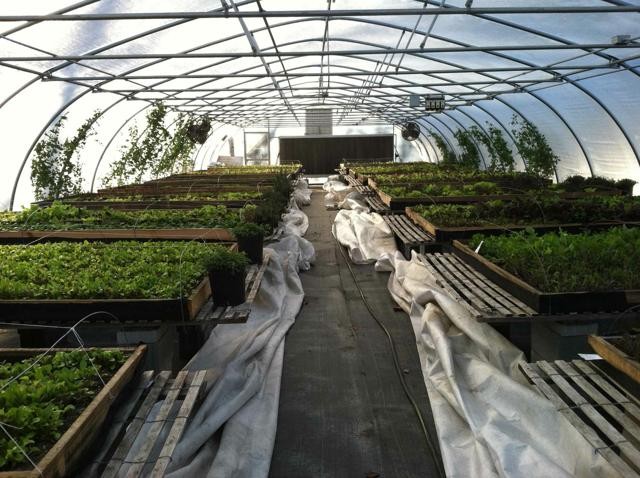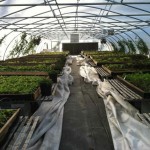- LETTUCE BEDS: Rise Up Rooted in Black Mountain uses a high hoop house combined with blankets at night to grow greens for Asheville restaurants throughout the winter. Courtesy of Tom Brody and Michele Fair
- SEASONAL CHANGES: Knife & Fork in Spruce Pine solves the dilemma of a wintertime lack of produce by serving a series of creatively themed meals in January and February that don’t rely on all-local ingredients. Knife & Fork's chef Nate Allen teaching Katja Dohse (an Asheville native and member of their kitchen team) how to put together a ceviche plate on her station. Courtesy of Knife & Fork
As temperatures drop and winter settles in, the supply of local produce naturally dwindles. This situation proves challenging for restaurants that have staked their reputation on highlighting local fare.
Miki Kilpatrick, co-owner of Homegrown Restaurant in Asheville, grew up canning tomatoes and pickles and freezing corn for winter. “Putting up,” as she calls it, was part of the seasonal routine back then. Homegrown adheres to this tradition, but Kilpatrick admits menus can get challenging in the winter. She hopes the new zoning rules passed by Asheville City Council allowing hoop structures and greenhouses to be built without permits will result in winter farming becoming more commonplace. “As people learn what works well, there will be more education about how to extend the growing season,” Kilpatrick predicts.
One of Homegrown’s produce suppliers is Kendall Huntley of Whispersholler Farms in Arden. To meet the demand for year-round produce, Huntley has been trying for years to get a grant to build a 3,000-square-foot “high tunnel,” and finally this year he received it. The Environmental Quality Incentives Program is an initiative operating under the auspices of the U.S. Department of Agriculture’s Natural Resource Conservation Service. EQIP provides financial and technical assistance to agricultural producers. The goal is to assist producers in extending the growing season for high-value crops in an environmentally safe manner.
Getting the EQIP grant was not an easy process, but Huntley says, “If we can do it, anybody can.” Although the grant does not cover all expenses involved, Huntley, a 37-year-old musician-turned-farmer and proud new father, has learned to cut costs everywhere possible. He will enlist his cousins to help with labor and pick up the materials himself to avoid delivery charges. In return for the financial assistance, Huntley has agreed to keep records for five years as required by NRCS.
Winter may be challenging for restaurants, but it’s a marathon for local farmers. Rise Up Rooted is a farm in Black Mountain run by Tom Brody and Michele Fair. When they began farming three years ago, there were many farms in the area to compete with. Noticing a need that was not being met, Fair, a Florida resident for 30 years, says they “jumped into winter farming.”
Keeping costs down so as not to eat up profits is a serious challenge. Part of the issue has been the learning curve.“Last year we heated two houses,” Brody says, “and it cost us an arm and a leg in propane.” This year the plan is to use supplemental heat only on the coldest days.
“On a sunny day it can be 70 degrees in the greenhouse,” Fair reports. “But when you get three or four days without sun, you have to go with propane. Now we cover everything with blankets every night.” They also plan to move their hoop houses to an area with more solar exposure and sandy soil. “Soil temperature is critical,” Brody explains, “and sandy soil heats up faster.” Eventually, they hope to enclose their wash station, which includes an artesian well and salad spinners. “On a freezing rainy day, it’s tough to harvest,” Fair says.
Brody and Fair say business is booming. They attribute their success to relationships with many loyal clients, such as Chef “Cookie” Hadley at Black Mountain’s Morning Glory Café and Chef William Dissen at The Market Place in Asheville, to name a couple.
Dissen’s year-round strategy is to form relationships with local farmers, find out what they are growing and even ask them to grow something for him. “Planting the seeds for the menu,” as Dissen puts it. This aligns with The Market Place’s philosophy of community involvement. “The menu constantly evolves with what is available,” Dissen says. “I like to cook in the moment.” His goal is to educate diners on the health benefits of eating fresh, seasonal fare. “American diners are used to getting what they want when they want it, but by eating healthy we can actually medicate ourselves with the food we eat,” Dissen explains. He raves about the flavor and quality of the products he gets from Rise Up Rooted. “Their greens are spectacular,” he notes.
According to Fair, Chef Katie Button of Cúrate has tripled her use of their produce since they began partnering three years ago. Button explains, “Last year Tom Brody said he didn't think he would be able to continue producing greens throughout the winter, so I created a winter salad that wouldn't need greens. Then about a month later, he said they had it figured out, and I switched the salad again so we could support them. Give-and-take relationships are extremely important to make the system work for everyone.”
One restaurant that has decided to try a different tack this winter is Knife & Fork in Spruce Pine, because the farmers look forward to a much-needed winter break. “Basically, we will cease to be Knife & Fork in January and February,” says chef and owner Nate Allen. “Instead we will become seven different restaurants, changing the cuisine and the décor every weekend.” If this seems like a drastic measure, well, it is. “For two months we’re going to throw all the rules out the window,” Allen says.
Although this means a temporary departure from strictly local produce, the result will be a virtual getaway that changes every weekend. Destinations include Mexico, Paris, Italy, India, China, Spain and 1931 Chicago. Allen shares credit for this ambitious undertaking with his cohorts, Sous-Chef Stewart Lyon and Manager Emma Nash. Their vision is to create authentic cuisine, made from scratch, and design an atmosphere to match.
Allen recommends Asheville residents make a destination out of it. “Start with a scenic drive up the parkway, maybe see Crabtree Falls or shop downtown Spruce Pine,” he suggests. “Then stop in Fork & Knife for dinner and spend the night at a nearby B&B.”
The festivities at Knife & Fork run Jan. 9 through Feb. 22 and include Valentine’s Day. For reservations, call (828) 765-1511 or visit knifeandforknc.com.





Before you comment
The comments section is here to provide a platform for civil dialogue on the issues we face together as a local community. Xpress is committed to offering this platform for all voices, but when the tone of the discussion gets nasty or strays off topic, we believe many people choose not to participate. Xpress editors are determined to moderate comments to ensure a constructive interchange is maintained. All comments judged not to be in keeping with the spirit of civil discourse will be removed and repeat violators will be banned. See here for our terms of service. Thank you for being part of this effort to promote respectful discussion.